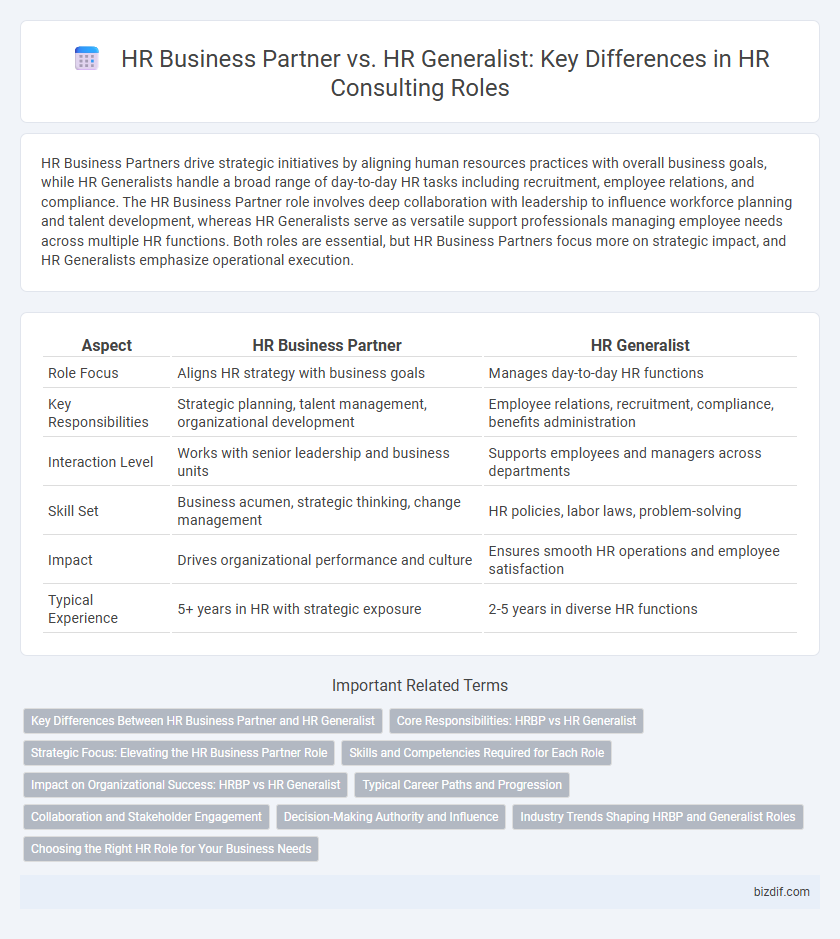HR Business Partners drive strategic initiatives by aligning human resources practices with overall business goals, while HR Generalists handle a broad range of day-to-day HR tasks including recruitment, employee relations, and compliance. The HR Business Partner role involves deep collaboration with leadership to influence workforce planning and talent development, whereas HR Generalists serve as versatile support professionals managing employee needs across multiple HR functions. Both roles are essential, but HR Business Partners focus more on strategic impact, and HR Generalists emphasize operational execution.
Table of Comparison
| Aspect | HR Business Partner | HR Generalist |
|---|---|---|
| Role Focus | Aligns HR strategy with business goals | Manages day-to-day HR functions |
| Key Responsibilities | Strategic planning, talent management, organizational development | Employee relations, recruitment, compliance, benefits administration |
| Interaction Level | Works with senior leadership and business units | Supports employees and managers across departments |
| Skill Set | Business acumen, strategic thinking, change management | HR policies, labor laws, problem-solving |
| Impact | Drives organizational performance and culture | Ensures smooth HR operations and employee satisfaction |
| Typical Experience | 5+ years in HR with strategic exposure | 2-5 years in diverse HR functions |
Key Differences Between HR Business Partner and HR Generalist
HR Business Partners focus on aligning human resource strategies with business goals, acting as strategic advisors to leadership, while HR Generalists manage day-to-day HR operations, such as recruitment, employee relations, and compliance. The HR Business Partner role demands strong business acumen and the ability to influence organizational change, whereas the HR Generalist emphasizes broad HR knowledge and operational execution. Key distinctions also include the HR Business Partner's involvement in workforce planning and change management versus the HR Generalist's hands-on involvement in policy implementation and employee support.
Core Responsibilities: HRBP vs HR Generalist
HR Business Partners focus on aligning HR strategies with business objectives, collaborating closely with leadership to drive workforce planning, talent management, and organizational development. HR Generalists manage day-to-day HR functions such as employee relations, recruitment, compliance, and benefits administration. While HRBPs serve as strategic consultants influencing business outcomes, HR Generalists provide comprehensive operational support across multiple HR disciplines.
Strategic Focus: Elevating the HR Business Partner Role
The HR Business Partner role emphasizes strategic alignment by collaborating with leadership to drive business goals and workforce planning, whereas the HR Generalist typically handles day-to-day operational HR tasks. Elevating the HR Business Partner role involves leveraging data analytics, talent management, and organizational development to influence long-term business outcomes. This strategic focus enables HR Business Partners to act as key advisors in shaping company culture and driving transformation initiatives.
Skills and Competencies Required for Each Role
HR Business Partners require strategic thinking, strong business acumen, and advanced change management skills to align HR initiatives with organizational goals. HR Generalists need a broad knowledge of HR functions, excellent communication abilities, and proficiency in employee relations, recruitment, and compliance. While HR Business Partners focus on influencing leadership and driving organizational development, HR Generalists manage day-to-day HR operations and provide comprehensive support across multiple HR disciplines.
Impact on Organizational Success: HRBP vs HR Generalist
HR Business Partners drive organizational success by aligning HR strategies with business objectives, fostering leadership development, and providing data-driven insights for decision-making. HR Generalists contribute by managing day-to-day HR operations, ensuring compliance, and supporting employee relations, which maintain workforce stability. The strategic impact of HRBPs on business growth and transformation typically surpasses the operational focus of HR Generalists.
Typical Career Paths and Progression
HR Business Partners often progress from HR Generalist roles, gaining strategic experience in aligning HR initiatives with business goals and advancing toward senior leadership positions such as HR Director or Chief Human Resources Officer. HR Generalists typically start in entry-level HR roles, developing broad expertise in recruitment, employee relations, and compliance before specializing or transitioning to HR Business Partner or managerial roles. Career progression for HR Business Partners emphasizes strategic impact and business influence, whereas HR Generalists build foundational HR skills that support diverse specializations and leadership development.
Collaboration and Stakeholder Engagement
HR Business Partners excel in strategic collaboration by aligning HR initiatives with business goals, fostering strong relationships with senior leaders and key stakeholders for impactful decision-making. HR Generalists primarily handle operational HR tasks while supporting cross-functional teams through effective communication and coordination. Emphasizing stakeholder engagement, HR Business Partners proactively drive organizational change, whereas HR Generalists ensure seamless employee relations and day-to-day HR support.
Decision-Making Authority and Influence
HR Business Partners possess greater decision-making authority and influence compared to HR Generalists, as they align HR strategies with business objectives and drive organizational change. HR Business Partners collaborate closely with senior leadership to shape workforce planning, talent management, and performance initiatives, whereas HR Generalists handle operational HR tasks with limited strategic input. This distinction positions HR Business Partners as key influencers in business outcomes, while HR Generalists support foundational HR functions.
Industry Trends Shaping HRBP and Generalist Roles
Evolving industry trends emphasize digital transformation and data-driven decision-making, escalating the strategic value of HR Business Partners in aligning human capital with business goals. HR Generalists increasingly adopt specialized skills to manage complex employee relations and compliance amid shifting labor laws and remote work models. Both roles require agility in leveraging technology and analytics to enhance workforce productivity and organizational culture in dynamic market environments.
Choosing the Right HR Role for Your Business Needs
Selecting the ideal HR role hinges on your business's strategic priorities and operational scale, where an HR Business Partner aligns HR initiatives with overall business goals, driving organizational change and talent management at a strategic level. In contrast, an HR Generalist manages a broad range of HR functions including recruitment, employee relations, and compliance, making them suitable for businesses requiring comprehensive HR support without a dedicated strategic focus. Understanding these distinctions ensures tailored HR solutions that optimize workforce performance and support business growth effectively.
HR Business Partner vs HR Generalist Infographic

 bizdif.com
bizdif.com